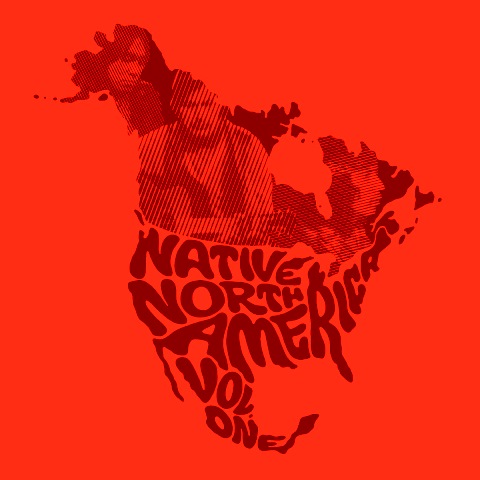 Various Artists: Native North America (Vol. 1) – Aboriginal Folk, Rock and Country 1966–1985
Various Artists: Native North America (Vol. 1) – Aboriginal Folk, Rock and Country 1966–1985
America’s music could be jazz, gospel, blues or rock ’n’ roll. Or all of them. Each has black roots. Then there’s the white-rooted country, which also informed rock ’n’ roll. Taking the simplistic line has its problems and doesn’t allow for blurred boundaries, nuance and the fact that history is never neat, but it is clear that all these musical forms generally and initially proliferated amongst communities that are not native to the American continent. What about the music of native North Americans?
Native North America seeks to answer this question with an emphasis on, as its subtitle attests, folk, rock and country. Although Willie Dunn’s intense “Peruvian Dream (Part 2)” draws from it, this is not a collection of traditional music but a compilation gauging the reaction of North America’s aboriginal peoples to the popular music of the day and filtering it through a particular consciousness. If the 34 tracks stuck to the stylistic tropes of the forms adopted, this might be little more than an interesting compilation. Instead, Native North America showcases unique singers and songwriters who sound like no one or nothing else.
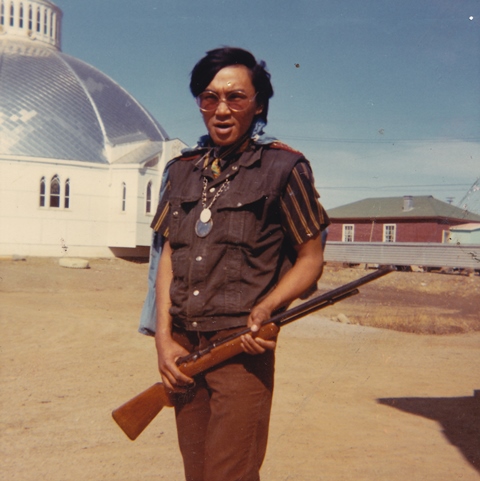 For the wider world, the names are obscure. There is no Jesse Ed Davis, Buffy Sainte-Marie, Redbone, Link Wray or even the part-Cherokee Jimi Hendrix. Instead, the two CDs inside the covers of this fine case-bound book (120 pages, profusely illustrated, with in-depth liner notes and all the lyrics – translated into English where necessary) include David Campbell, Lloyd Cheechoo, Eric Landry, Willy Mitchell, Willie Thrasher and Sugluk. The eye-opening – even more so than the New Age music collection I Am The Center from this time last year – Native North America is an alternate history of North America’s music. (pictured left: Willie Thrasher)
For the wider world, the names are obscure. There is no Jesse Ed Davis, Buffy Sainte-Marie, Redbone, Link Wray or even the part-Cherokee Jimi Hendrix. Instead, the two CDs inside the covers of this fine case-bound book (120 pages, profusely illustrated, with in-depth liner notes and all the lyrics – translated into English where necessary) include David Campbell, Lloyd Cheechoo, Eric Landry, Willy Mitchell, Willie Thrasher and Sugluk. The eye-opening – even more so than the New Age music collection I Am The Center from this time last year – Native North America is an alternate history of North America’s music. (pictured left: Willie Thrasher)
It’s hardly surprising that the stories of some of those collected reveal the difficulties of musically expressing yourself if Native American. At age five, Willie Thrasher began a life in a series of Catholic schools where he was forced to abandon his Inuvialuit culture, made to cut his hair and toe the line. Music came as a way out. Inspired by The Beatles, he formed a band in their mould but after leaving school began exploring how to express who he really was through his music. He supported himself working as a security guard. Meanwhile, Willy Mitchell began writing poetry in hospital at age 16 after being shot in the head by police. Some of the money he received in a settlement was spent on a guitar.
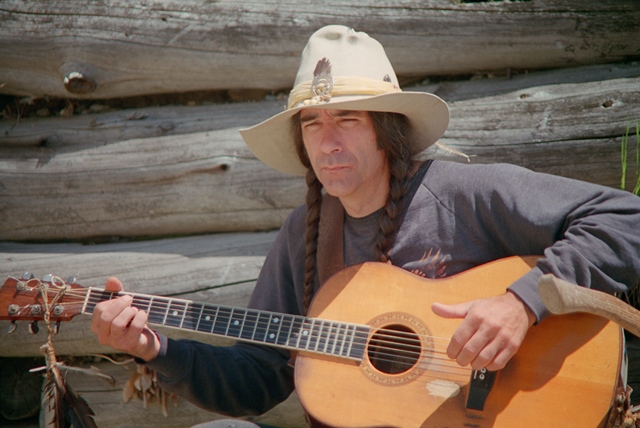 As well as the stories, Native North America is also about getting this arresting music widely heard. It opens with Willie Dunn’s brooding “I Pity the Country”. “The bill of rights throws me…silly civil servants, they thrive off my body, their trip is with power…police they arrest me” he sings in an intense outpouring. Eric Landry’s “Out of the Blue” is equally charged, its lyrics pointedly beginning “I know you came here of the blue, to this place…you seem to think this place is your home, do you treat it well?” Dispossession runs through Native North America. (pictured right, Eric Landry)
As well as the stories, Native North America is also about getting this arresting music widely heard. It opens with Willie Dunn’s brooding “I Pity the Country”. “The bill of rights throws me…silly civil servants, they thrive off my body, their trip is with power…police they arrest me” he sings in an intense outpouring. Eric Landry’s “Out of the Blue” is equally charged, its lyrics pointedly beginning “I know you came here of the blue, to this place…you seem to think this place is your home, do you treat it well?” Dispossession runs through Native North America. (pictured right, Eric Landry)
Even when the Nunavik band Sugluk adopt rock – and come off like a wonky third album Velvet Underground colliding with Neil Young – the tension integral to the fantastic “Fall Away” hints at frustration and anger. Less tightly coiled are Sikumiut, whose “Inuktitut” (named after the Inuit language) sounds like a highly exotic refraction of late Sixties Doug Sahm despite being recorded in 1976. Standard timelines and influence arcs do not apply here.
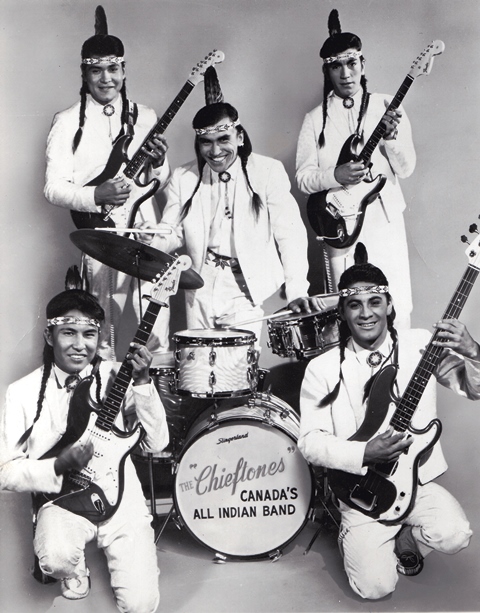 There are though, archetypical bands who traded on their heritage. Edmonton, Alberta’s Chieftones – tagged Canada’s All Indian Band by their manager – are the earliest entry. Their 1966 garage rocker “I Shouldn’t Have Did What I Done” is as charming as heck. Saddle Lake Drifting Cowboys’ 1982 instrumental "Modern Rock" marries The Ventures’ instro-rock to a snappy, upbeat country. They could have been Alberta’s Los Lobos. (pictured left, The Chieftones)
There are though, archetypical bands who traded on their heritage. Edmonton, Alberta’s Chieftones – tagged Canada’s All Indian Band by their manager – are the earliest entry. Their 1966 garage rocker “I Shouldn’t Have Did What I Done” is as charming as heck. Saddle Lake Drifting Cowboys’ 1982 instrumental "Modern Rock" marries The Ventures’ instro-rock to a snappy, upbeat country. They could have been Alberta’s Los Lobos. (pictured left, The Chieftones)
As stylistically varied as it is, Native North America is crammed with tracks which would be worth hearing on their own. It is as kaleidoscopic as the wells it draws from. This is not the end of the story though. The regions dwelt upon are Alaska, Canada and the north of the United States. A second volume, with an emphasis on areas to the south is in production. Can’t wait.

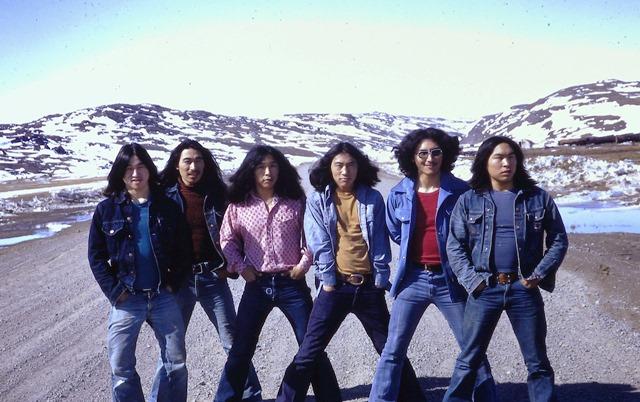












Add comment